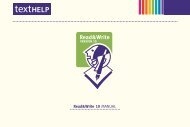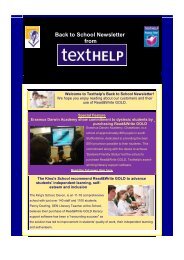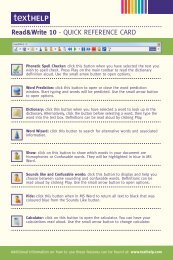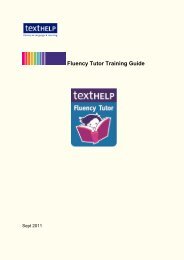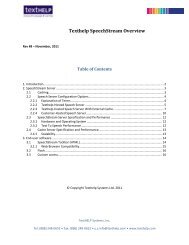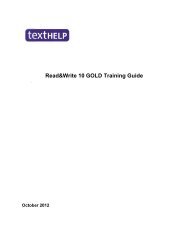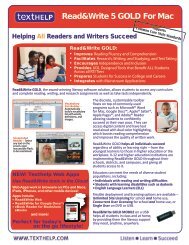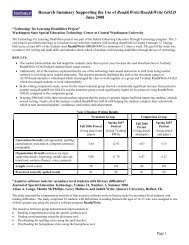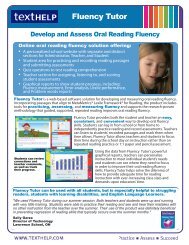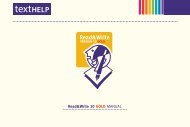01 NRDC Dyslexia 1-88 update - Texthelp
01 NRDC Dyslexia 1-88 update - Texthelp
01 NRDC Dyslexia 1-88 update - Texthelp
You also want an ePaper? Increase the reach of your titles
YUMPU automatically turns print PDFs into web optimized ePapers that Google loves.
160<br />
Research Report<br />
Function Checklist item Observations<br />
Verbal short-term<br />
memory<br />
cont.<br />
Has trouble dialling phone<br />
numbers (21)<br />
Has difficulty following<br />
directions, especially multiple<br />
directions (25)<br />
Unable to tell you what has just<br />
been said (27)<br />
Finds it hard to remember the<br />
sense of what has been read (31)<br />
Becomes confused when<br />
speaking in public (35)<br />
Has difficulty in taking telephone<br />
messages for others (36)<br />
The problem might be also attentional<br />
or linguistic<br />
A failure of conceptual, not verbal,<br />
recall but might originate in a verbal<br />
short-term memory failure.<br />
But so do many people. Practice makes<br />
perfect.<br />
Might also entail problems with speech<br />
perception, spelling and writing.<br />
Verbal working<br />
memory<br />
Has difficulty in reciting months<br />
backwards (39)<br />
Has difficulty with mental<br />
arithmetic (56)<br />
Attention<br />
Has a short attention span, is<br />
impulsive and/or easily<br />
distracted (4)<br />
Poor readers might have deficits in one<br />
or more of the functions of sustained<br />
attention, selective attention,<br />
attentional switching and auditoryverbal<br />
working memory.<br />
Social cognition<br />
Has difficulty in telling or<br />
understanding jokes (5)<br />
Might involve misunderstanding of<br />
interpersonal dynamics.<br />
Has difficulty with social skills,<br />
might misinterpret social cues (7)<br />
Might entail linguistic deficits<br />
(vocabulary or affective prosody) or<br />
difficulty in interpreting facial<br />
expression, stance and gesture.<br />
Motor control<br />
Poorly coordinated (26)<br />
Might indicate cerebellar dysfunction.<br />
Scrambles the sounds in long<br />
words (37)<br />
Might indicate impaired interhemispheric<br />
communication.<br />
Miscellaneous<br />
Day-to-day variability in<br />
performance (1)<br />
Effortful work of any kind requires full<br />
concentration and even slight fatigue<br />
might lead to marked performance<br />
decrements.<br />
Can read well but not write well,<br />
or vice versa (2)<br />
The former is likely to be more common<br />
than the latter.



